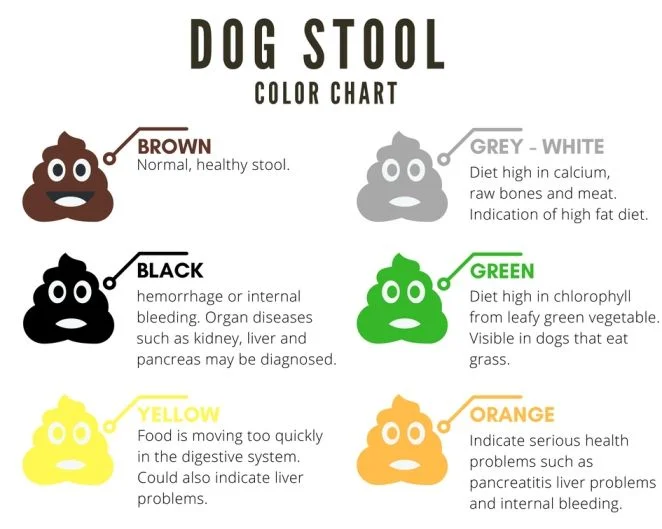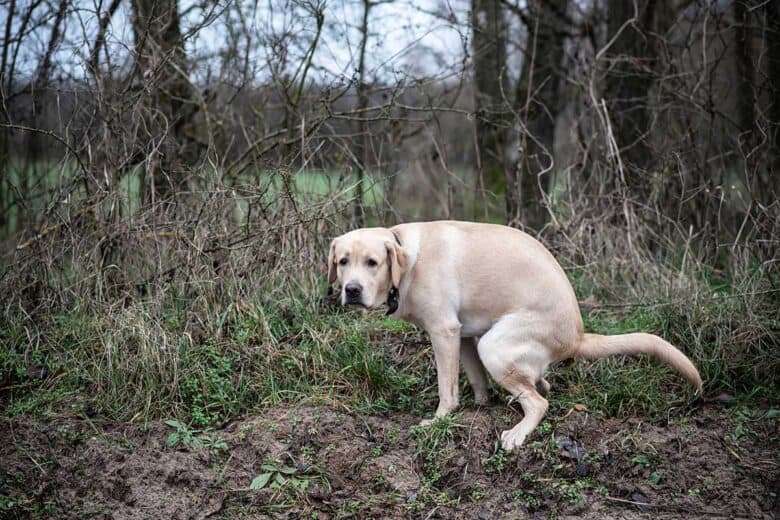Dealing with dog poop is a daily occurrence for dog owners, but Yellow Dog Poop is something different.
Table of Contents
While many people are frustrated with the idea of maintaining dog poop, this is something most of us are accustomed to!
In fact, as we get used to it, we begin to notice minute changes in the stool.
This is a good thing! There is no better way to assess your dog’s health than by examining their litter’s color, consistency, contents, and coating.
What comes out of your puppy tells you a lot about what is going on inside.
Ideally, a healthy dog poop should be relatively firm and uniformly brown. So when the poop crosses those rules, it stands like a sore thumb!
Also Read: Why is My Adult German Shepherd dog acting weird?
Yellow poop is an issue that is causing some alarm among dog owners. Whether it takes on a deeper shade of mustard yellow or has a thin yellow coating, the yellow dog poop is not something you should ignore!
What is the deal with variations of dog poop colors?
Before we get into yellow poop problems, it is good to understand why stool changes physical properties in the first place.
Color-changing stools are very common. Most dogs experience stability and color changes at some point in their lives. No matter how small the change, take it as a sign!

As mentioned before, Poop says a lot about your dog’s health. The gastrointestinal tract is constantly working to process food. Even when your dog is resting, it works overtime.
It is necessary for a process to throw out the whole process. Various biological functions affect the digestive process, leading to physiological changes in the fungus. Internal bleeding darkens the poop and causes redness.
Meanwhile, yellow and green colors often cause liver and bile production! Food and waste go through many steps before you make it on your lawn. When one of those stages is changed due to health issues, the stool reflects it.
Visiting your vet is always a good idea when big changes are behind their bizarre heads. One-off problems do not require immediate care. But if the problem persists, it is a good idea to take your puppy to the vet for some in-depth analysis.
Here’s a chart outlining different dog stool colors and possible reasons for each color:
| Stool Color | Possible Reasons |
|---|---|
| Brown | Normal and healthy |
| Black | Presence of blood (digested blood) |
| Red | Fresh blood in the stool |
| Yellow | Excess bile or dietary changes |
| Green | Rapid transit through the digestive system |
| Grey/Clay | Issues with bile flow or liver problems |
| Orange | Diet high in pigments or food additives |
| White | Lack of bile or pancreatic issues |
| Mucus-like | Inflammation or irritation in the intestines |
| Watery/Diarrhea | Infection, dietary changes, or intestinal disorders |
Please note that this chart provides general information and stool color variations can have multiple causes. If you notice persistent changes in your dog’s stool color, especially when accompanied by other concerning symptoms, it is advisable to consult a veterinarian for a proper evaluation and diagnosis.
5 Possible Causes for Yellow Dog Poop
The causes of yellow dog poop vary drastically. In most cases, the culprit is the innocent. But, it can also be a sign of a serious underlying health problem. Here are some common reasons why your dog may have yellow mucus or pigment.
Feasts and Colors
Have you recently gifted your dog with a yellow treat? If so, it could be the culprit right there!
Colors and intense pigmentation in foods are known to come out from the other end. We usually see this with green-colored dinners. Popular dental treats cause green poop every once in a while. But yellow dinners can do the same thing.
Dogs are not built to process synthetic dyes. Depending on the intensity of the color, the food in their stomach will take on color throughout.
In general, this is not something you should worry about. As long as your dog does not display other traits, this is no big deal! We always recommend trying to go without color and additives for dinners!
This not only eliminates problems such as colored stools but also reduces the chances of adverse reactions.
Eating yellow objects
Like colors, non-food items can cause a ruckus in your dog’s system. Dogs get into all sorts of trouble. Most people take heavily pigmented items such as crayons, markers, or chalk.
The pigment in the edible toys goes into your dog’s stool. The color is usually mossy and random rather than the same color as the poop.
Chances are, color comes with some enjoyable side effects! Eating toys and art supplies can cause some serious digestive problems. Your dog’s system will reject what they eat, your dog will feel better if it does not, diarrhea of vomiting, constipation, and other problems will come!
Make sure to keep cute toys and household items away from your dog!
Food intolerance
Orange or mustard yellow waste also means that your dog is experiencing food intolerance.
This happens very frequently when dog owners switch to a new food product. The new food may contain ingredients that your dog’s stomach is not accustomed to. Or, it may contain previously unknown allergens that your puppy cannot handle.
When this happens, your dog’s companion will suffer from tons of indigestion and stomach pain. Usually, the stool comes out soft and there may be yellow mucus.
Yellow muscle is hard to spot at first. But on closer inspection, the poop looks greasy and thin.
If you suspect that food intolerance is the cause, it may be time to make some dietary changes. You can visit your vet for an allergy test or do some experiments to find the unpleasant substance.
If you want fast relief, go with a limited-ingredients diet or a bland diet. They are on the simple side, reducing the chances of impatience problems.
The presence of bile
Bile is an essential substance that comes from your dog’s liver. It is responsible for most things. But its obvious effect is to change the color of the waste from green to brown! Bile pigment mixes with the waste and goes through a chemical process where the enzymes change their signature from yellow to a familiar brown color.
When you see mustard-colored poop or feces covered in yellow mud, you are looking towards that bile pigment. This is usually a problem when the poop is evenly yellow.
So what does this mean?
This means that waste travels very fast through the gastrointestinal tract. By that enzymatic change the bile needs some time. The material does not reabsorb fast enough, causing it to go with the poop!
There are many reasons for this to happen, so it is important to take your dog to the vet.
Parasites and Infections
Finally, yellow poop may be a sign of a parasitic or bacterial infection in the digestive tract.
Parasites and harmful bacteria do a lot to destroy your puppy system. It’s not just the yellow you see! Depending on the severity of the problem, you may also see blood streaks, major consistency changes, or even worms.
Yellow stool is one of the many potential side effects. You need to resolve potential infections as soon as possible. If left untreated, they can become more serious and life-threatening.
Is the Yellow Dog Poop a cause for concern?
Yellow dog poop is not always an emergency. But, that doesn’t mean you shouldn’t consider it a serious problem.
Yellow dog poop is not necessarily a medical emergency, but it does warrant a visit to the veterinarian to rule out any underlying health issues. The color yellow in dog stool can be caused by a variety of factors, ranging from harmless dietary indiscretions to more serious health concerns.
Common Causes of Yellow Dog Poop
- Dietary Indiscretion: Consumption of non-food substances like crayons, chalk, or other foreign substances can essence yellow stool due to the existence of these substances in the digestive system.
- Food Intolerance or Allergy: Some dogs may have adverse reactions to certain foodstuffs, leading to yellow stool. This can be due to a change in diet or the introduction of new foods.
- Infections: Bacterial, viral, or parasitic infections can source yellow stool, often go together with by other symptoms like fever, vomiting, and diarrhea.
- Liver or Gallbladder Problems: Problems with the liver or gallbladder can cause yellow stool due to the existence of bile pigments in the digestive system.
- Pancreatitis: Inflammation of the pancreas can lead to yellow stool, often accompanied by vomiting and stomach pain.
Don’t ignore it! Better take precautions than being sorry later on.
Mustard yellow dog poop
The color of a dog’s stool depends on many factors, including their diet, overall health, and any underlying medical conditions. Mustard-colored stools in dogs can have a variety of causes. Here are some possible reasons:
- Diet: Certain foods or treats containing yellow pigments can lead to mustard-colored stools. If you’ve recently introduced a new type of food or treat to your dog’s diet, that could be the cause.
- Bile: Bile is a digestive fluid produced by the liver and stored in the gallbladder. It helps to break down fats. If there is a rapid passage of stool through the intestines, the bile does not have enough time to break down, resulting in a mustard color.
- Liver or gallbladder problems: Liver or gallbladder problems affect bile production or flow, leading to changes in stool color. If your dog’s stool consistently appears mustard-colored, it’s a good idea to consult a veterinarian to evaluate the health of the liver or gallbladder.
- Infections or gastrointestinal problems: Certain infections or gastrointestinal problems, such as inflammation or malabsorption, can affect the color and consistency of stool. These conditions may require veterinary attention.
- Medications or supplements: Some medications or supplements can change the color of stool as a side effect. If your dog is taking any medications or supplements, consult a prescribing veterinarian to determine if this is the cause.
It is important to note that these are general possibilities, and the specific cause can only be determined by a thorough examination by a veterinarian. If you notice persistent changes in the color of your dog’s poop, especially if accompanied by other symptoms such as diarrhea, vomiting, loss of appetite, or lethargy, it is recommended to consult a veterinarian for proper diagnosis and treatment.
Final Points
Picking up a dog poop is not always fun. But, it does provide a good opportunity to track your puppy’s health. If you start looking for yellow dog poop that is nowhere to be found, do not hesitate to take some action.
Keep an eye on your dog’s behavior and the frequency of yellowing. consult with your vet to rule out any serious medical issues.

